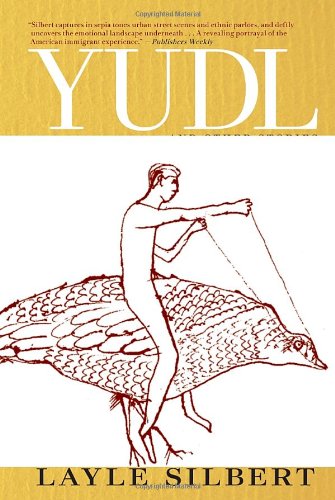 Yudl and his wife Ryah—Jewish immigrants from Ukraine– and their native-born daughters, Ellen and Baby, are trying to gain a toehold in the US of A. In one novella and 19 short stories, writer Layle Silbert [1913-2003] presents their joys and heartbreaks, victories and disappointments. It’s a classic immigrant tale—albeit one in which the class, race and gender dynamics of 1920s Chicago are central players. Anarchists Nicola Sacco and Bartolomeo Vanzetti, Italian immigrants accused of murder and executed in 1927–figure prominently in several of the pieces. The aftermath of their deaths—and the fear that someone in Yudl and Ryah’s circle might be falsely accused of something similarly heinous, is made painfully real and horrifyingly vivid. There’s nothing polished here. Like immigrant life itself, Silbert’s work is jagged and rough. It’s also powerful.
Yudl and his wife Ryah—Jewish immigrants from Ukraine– and their native-born daughters, Ellen and Baby, are trying to gain a toehold in the US of A. In one novella and 19 short stories, writer Layle Silbert [1913-2003] presents their joys and heartbreaks, victories and disappointments. It’s a classic immigrant tale—albeit one in which the class, race and gender dynamics of 1920s Chicago are central players. Anarchists Nicola Sacco and Bartolomeo Vanzetti, Italian immigrants accused of murder and executed in 1927–figure prominently in several of the pieces. The aftermath of their deaths—and the fear that someone in Yudl and Ryah’s circle might be falsely accused of something similarly heinous, is made painfully real and horrifyingly vivid. There’s nothing polished here. Like immigrant life itself, Silbert’s work is jagged and rough. It’s also powerful.
The novella, Yudl, focuses on the family breadwinner and chronicles his despair over his wife’s incessant push for upward mobility. Ryah, who wants to be more than a stay-at-home wife and mother, fantasizes about buying and managing property. After all, she nags Yudl, isn’t this the American Dream?
Yes, Yudl concedes, it is. Nonetheless, he sees Ryah’s scrimping to buy a dwelling as a betrayal of the Socialist Zionist principles he holds dear. Even though he eventually borrows enough cash to make Ryah happy, his acquiescence is far from seamless: “I’m going to be a landlord, he was complaining to himself as he drove, and I don’t want to be a landlord. What was a man who made his living on a Yiddish newspaper, the Jewish Courier, doing as the owner of a piece of property, an unfinished building with four flats and even soon to be collecting rents?†Marital discord—and the angst it causes—is sharply drawn in this sad account.
Other stories in the collection focus on Ellen and benchmark her coming of age, from toddlerhood to the completion of college. We learn that she was always an incessant reader, a kid who somehow figured out that education would give her a means of escape, a way to avoid the drudgery of her parents’ lives. At the same time, we’re made privy to the anomie she feels as someone who is neither an immigrant nor a full-fledged American. In Rich and Married, for example, an adolescent Ellen longs to win a writing contest and thinks that her protagonist needs to be everything that her family is not. But how to imagine a world that is as foreign to her as the ghettos—called shtetls in Yiddish–of her parents’ childhoods?
Even college is difficult for Ellen since she has to live at home and get driven to and from campus by her dad. “She didn’t want anyone to see her foreign father with his terrible accent in his battered old car deliver her to the university which lay in a posh neighborhood on the South Side,†Silbert writes. Worse, once in her philosophy class, “the professor called on the boys, ignoring her and the other girl, and talked about difficult matters with a gleeful smile.†Later, sexual harassment—at the time an unnamed behavior—makes Ellen feel .even more invisible.
It’s gritty stuff and Silbert’s characters are realistically drawn, if not always likeable. My only quibble is that the collection has no Introduction, so it is impossible to know when these stories were written, if they were previously published, and how they were received by an earlier generation of readers. Nonetheless, YUDL and Other Stories stands on its own, and offers insight into the bittersweet realities at the core of immigrant existence. While the early 20th century setting has the ring of distant history, the human emotions that Silbert captures are both universal and timeless. What’s more, the struggle to balance assimilation with retention of one’s culture is as potent today as it was a century ago.

Leave a Reply